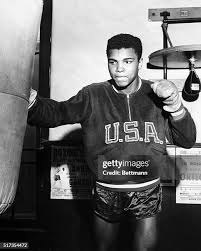
Introduction
Muhammad Ali, widely regarded as one of the greatest boxers of all time, not only revolutionised the sport of boxing but also became an enduring figure in popular culture and humanitarian efforts. His impact transcends the ring, making him an important figure in discussions about sports, race, and social justice. As we revisit Ali’s legacy, it is essential to reflect on the profound influence he has had both within and beyond the world of athletics.
A Life of Triumph and Challenge
Born Cassius Marcellus Clay Jr. on January 17, 1942, in Louisville, Kentucky, Ali began boxing at 12 and quickly showcased his extraordinary talent. He first gained national attention at the age of 18 when he won a gold medal at the 1960 Rome Olympics. Shortly thereafter, he won the heavyweight championship by defeating Sonny Liston in 1964. This victory marked the beginning of a remarkable career.
Shortly after his title win, Clay announced that he had joined the Nation of Islam and changed his name to Muhammad Ali, a decision that sparked controversy and marked a pivotal moment in his life. Ali’s outspoken views on race and religion solidified his role not only as an athlete but as a civil rights advocate. His refusal to be drafted into the Vietnam War on the grounds of his religious beliefs led to a landmark Supreme Court case and his title being stripped away, a move that resonated with many during the civil rights movement.
Achievements and Influence
Ali’s boxing accomplishments are numerous, including three heavyweight titles and iconic fights against opponents like Joe Frazier, George Foreman, and Ken Norton. His bout with Frazier in 1971, known as the “Fight of the Century,” became a cultural touchstone, symbolising the intense political and social debates of that era.
Beyond the ring, Ali’s influence extended into philanthropy and humanitarian efforts. He dedicated much of his life post-retirement to raising awareness and funds for various causes, including Parkinson’s disease research, which he had been diagnosed with in the 1980s. His work earned him numerous accolades, demonstrating how he bridged the gap between sports and social activism.
Conclusion: An Enduring Legacy
Though Muhammad Ali passed away on June 3, 2016, his legacy continues to inspire generations worldwide. His courage, both inside and outside the ring, resonates in current social justice movements, making him an emblem of resilience and integrity. As we celebrate Ali’s impact on both sports and society, we are reminded of the potential of athletes to enact change and create dialogue on critical issues. The legacy of Muhammad Ali goes beyond boxing; it is a lifelong lesson in activism, courage and the pursuit of equality.
You may also like

Jack Willis: The Rising Star of English Rugby

The Rise of Harvey Elliott in Football

The Journey of Tim Seifert: A Cricket Sensation
SEARCH
LAST NEWS
- Remembering Wendy Richard: The Promise to Co-Star Natalie Cassidy
- How Did Anglian Water Achieve an ‘Essentials’ Rating for Mental Health Accessibility?
- Shai Hope Leads West Indies in T20 World Cup Clash Against South Africa
- What We Know About Weston McKennie: Future at Juventus and Past at Leeds
- What We Know About the Upcoming Live Nation Antitrust Trial